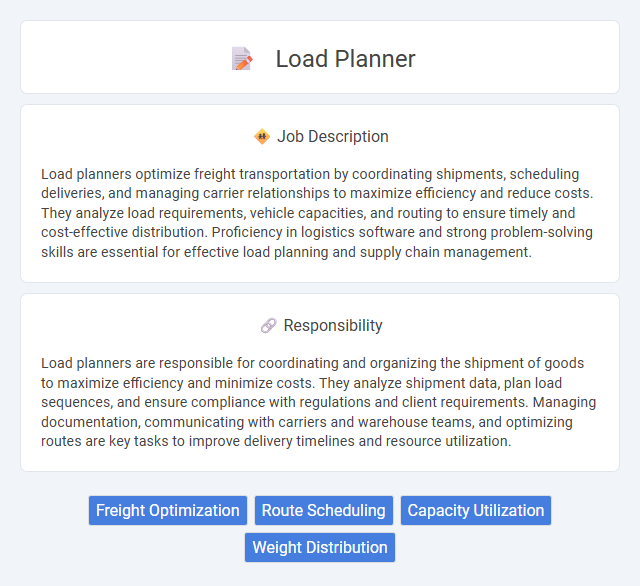
Load planners optimize freight transportation by coordinating shipments, scheduling deliveries, and managing carrier relationships to maximize efficiency and reduce costs. They analyze load requirements, vehicle capacities, and routing to ensure timely and cost-effective distribution. Proficiency in logistics software and strong problem-solving skills are essential for effective load planning and supply chain management.
Individuals with strong organizational skills and the ability to handle pressure are likely to be suitable for a Load Planner position. Those who can efficiently coordinate schedules and communicate clearly with various teams have a higher probability of excelling in this role. Candidates lacking attention to detail or struggling with time management may find this job challenging.
Qualification
Load planners require strong organizational skills and a solid understanding of logistics and supply chain management to efficiently schedule and coordinate shipments. Proficiency in transportation management systems (TMS), data analysis, and relevant software tools is essential for optimizing load plans and ensuring cost-effective delivery. A high school diploma or equivalent is typically required, with many employers preferring candidates who hold a bachelor's degree in logistics, business administration, or a related field.
Responsibility
Load planners are responsible for coordinating and organizing the shipment of goods to maximize efficiency and minimize costs. They analyze shipment data, plan load sequences, and ensure compliance with regulations and client requirements. Managing documentation, communicating with carriers and warehouse teams, and optimizing routes are key tasks to improve delivery timelines and resource utilization.
Benefit
A load planner job likely offers significant benefits such as optimizing transportation efficiency, reducing shipping costs, and improving delivery timelines. This role probably enhances supply chain productivity by ensuring loads are maximized and resources are effectively allocated. Effective load planning may also contribute to better customer satisfaction through timely and reliable shipments.
Challenge
Load planner roles probably involve complex logistical challenges requiring precise coordination of shipments to optimize space and minimize costs. Balancing ever-changing schedules and regulatory compliance may demand quick problem-solving and adaptability. The likelihood of encountering unexpected delays or equipment issues could test one's ability to remain calm under pressure.
Career Advancement
A load planner ensures efficient freight and cargo distribution by optimizing shipment loads and coordinating logistics schedules to reduce costs and improve delivery times. Mastery of advanced software tools and understanding of supply chain management enhance career prospects, leading to roles such as logistics manager or operations director. Continuous upskilling in data analytics and transportation regulations positions load planners for leadership opportunities within logistics and distribution companies.
Key Terms
Freight Optimization
Load planners optimize freight by efficiently coordinating shipment schedules, consolidating loads, and selecting cost-effective transportation routes. They analyze shipment data and carrier capabilities to reduce transit times and minimize freight costs while maximizing load capacity. Expertise in logistics software and real-time tracking systems enhances the accuracy and efficiency of freight optimization strategies.
Route Scheduling
Load planners play a critical role in route scheduling by optimizing delivery sequences to minimize travel time and reduce fuel costs. They analyze shipment data, vehicle capacities, and traffic patterns to create efficient routes that maximize load utilization. Effective route scheduling enhances supply chain performance, ensuring timely deliveries and improved customer satisfaction.
Capacity Utilization
Load planners optimize capacity utilization by strategically organizing shipments to maximize space and weight limits within transport vehicles. They analyze shipment volumes, dimensions, and route schedules to ensure efficient load distribution and prevent underutilization. Effective capacity utilization reduces transportation costs and improves delivery timelines while maintaining compliance with safety standards.
Weight Distribution
Load planners ensure optimal weight distribution by analyzing cargo specifications and vehicle capacity to enhance transportation safety and efficiency. Precise calculations prevent axle overloads and improve fuel economy, minimizing wear and regulatory violations. Advanced software tools assist in creating balanced load configurations that comply with federal and state weight regulations.
 kuljobs.com
kuljobs.com